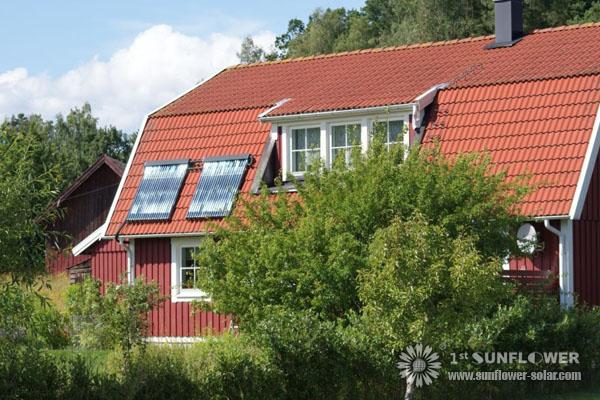How Solar hot waters save Money
Author:None
From:None
Post time:03/13/2012
View:2754

The market for solar water heaters may not be new, but it is attracting a lot of newcomers in recent years as more State and local culture incentives up. Sunnovations, which launched its first water heating system last year, announced Thursday that it has raised a series a round of funding to help expand their market to the States of the Northeast and the Colorado.
Sunnovations, founded in 2008, obtained financing from two seven Ventures in Colorado, but refused to reveal the amount. The CEO of the implementation underway, Matt Carlson, told us that the amount is in the single-digit millions, and the company raised $250,000 in funds angel before that. Initial funding enabled the company to design a system that uses pressure and gravity to pump and circulate hot liquids to heat the water, a patented design that comes with fewer parts and makes it cheaper to install and to operate than other systems in the market, said Carlson.
Based on Sunnovations McLean, Virginia, the engineers and the contracts with the American manufacturers to build their systems. Generate income with the sale of the systems installers and the last round of funding is key to expand its network of installers. It has signed up to installers in States in the mid-Atlantic, as Maryland, North Carolina and his home state of Virginia. The company recently entered into Massachusetts and goes to New York and by Connecticut, Carlson said. It has also been a dealer in Colorado.
Installers who are selling systems Sunnovations "include energy management in the South of North Carolina, Pennsylvania and SECCO in SunBug Solar in Massachusetts, said Carlson."
Although the market for solar water heaters has existed for decades, it has not grown as fast as it should, said Carlson. The companies that develop and install the more expensive solar electrical systems, for their part, have made a best fact to educate consumers, he added.
"This is a tremendously low market discussed." Many companies have not done a good job of telling the story of how (solar water heaters) may benefit as homeowner ", said Carlson.""Many of the web sites are technically very oriented and you have not made easier for people to understand."
Homeowners and businesses are eligible to receive a 30 percent federal tax credit investment for the installation of solar water heaters. A growing number of States are also offering discounts to encourage its use. California, for example, launched its incentives program called last year's CSI thermal. The State budgeted $350,8 million for the program and plans to operate until the end of 2017, or when the money runs out. New York has also launched a year of last delay that came with a budget of $25 million.
The appearance of government subsidies has attracted investors and entrepreneurs in the space of solar water heating. Cogenra Solar, founded in the year 2009 and goals and sectors of government companies, installed its first demonstration of the system in a winery in California last year and attracted more than $10 million in funding from investors like Khosla Ventures. EcoFirst, formerly known as DVT Solar, raised a $13.7 million B round last year and won contracts with several house-builders. Both Cogenra and EcoFirst are developing systems that can generate electricity and heat.
Sunnovations system ' is strictly to heat the water. The system comes with panels that direct sunlight to heat tubes inside containing a glycol (antifreeze) mixes. When heated, the mixture expands and moves by convection to pump 18-inches in height with the panels. The company has designed the pump to operate without electro-mechanical parts to reduce costs, said Carlson. The pump moves heat transfer fluid to a water storage tank, where a heat exchanger then heats the water.
The system also includes a tank on side of the solar panels to store the glycol mixture when the water heater is not in use for an extended period of time, such as when the owners go on holiday. Glycol mixture can overheat, break and corrode the pipes inside the panel if you leave the panels for far too long, said Carlson. Thus, when the water in the tank is already heated, heated and expanded glycol mixture moves into the tank.